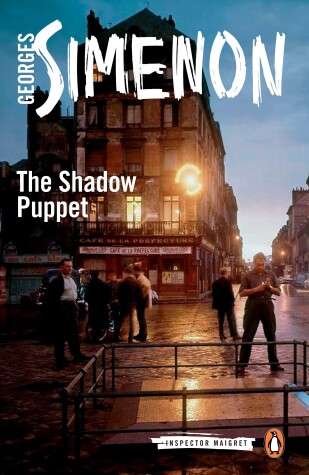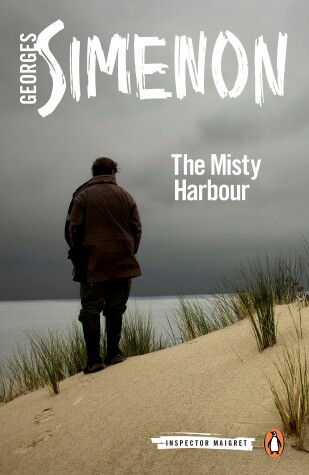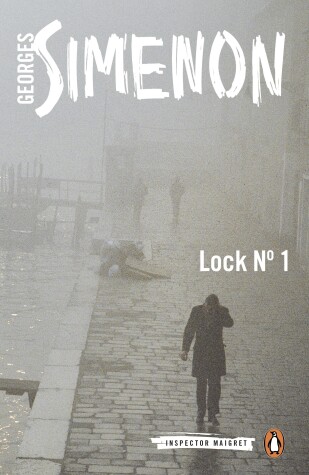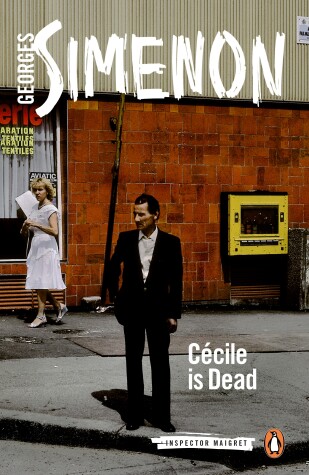Inspector Maigret
93 primary works • 95 total works
Book 11
'The father of contemporary European detective fiction' Ann Cleeves
'A radiant late afternoon. The sunshine almost as thick as syrup in the quiet streets of the Left Bank . . .
there are days like this, when ordinary life seems heightened, when the people walking down the street, the
trams and cars all seem to exist in a fairy tale.'
A story told by a condemned man leads Maigret to a bar by the Seine and into the sleazy underside of respectable Parisian life. In the oppressive heat of summer, a forgotten crime comes to light.
Penguin is publishing the entire series of Maigret novels in new translations. This novel is a revised translation, previously published as The Bar on the Seine.
'Compelling, remorseless, brilliant' John Gray
'One of the greatest writers of the twentieth century . . . Simenon was unequalled at making us look inside, though the ability was masked by his brilliance at absorbing us obsessively in his stories' Guardian
'A supreme writer . . . unforgettable vividness' Independent
Book 11
Book 12
A new translation of this gripping domestic tragedy, set in Simenon's very own neighbourhood.
One by one the lighted windows went dark. The silhouette of the dead man could still be seen through the frosted glass like a Chinese shadow puppet. A taxi pulled up. It wasn't the public prosecutor yet. A young woman crossed the courtyard with hurried steps, leaving a whiff of perfume in her wake.
Summoned to the dimly-lit Place des Vosges one night, where he sees shadowy figures at apartment windows, Maigret uncovers a tragic story of desperate lives, unhappy families, addiction and a terrible, fatal greed.
Penguin is publishing the entire series of Maigret novels in new translations. This novel has been published in previous translations as Maigret Mystified and The Shadow in the Courtyard.
'Compelling, remorseless, brilliant' John Gray
'One of the greatest writers of the twentieth century . . . Simenon was unequalled at making us look inside, though the ability was masked by his brilliance at absorbing us obsessively in his stories' Guardian
Book 12
Book 13
'The father of contemporary European detective fiction' Ann Cleeves
Maigret savoured the sensations of his youth again: the cold, stinging eyes, frozen fingertips, an aftertaste of coffee. Then, stepping inside the church, a blast of heat, soft light; the smell of candles and incense.
The last time Maigret went home to the village of his birth was for his father's funeral. Now an anonymous note predicting a crime during All Souls' Day mass draws him back there, where troubling memories resurface and hidden vices are revealed.
Penguin is publishing the entire series of Maigret novels in new translations. This novel has been published in a previous translation as Maigret Goes Home.
'Compelling, remorseless, brilliant' John Gray
'One of the greatest writers of the twentieth century . . . Simenon was unequalled at making us look inside, though the ability was masked by his brilliance at absorbing us obsessively in his stories' Guardian
Book 13
Book 14
'The father of contemporary European detective fiction' Ann Cleeves
She wasn't an ordinary supplicant. She didn't lower her eyes. There was nothing humble about her bearing. She spoke frankly, looking straight ahead, as if to claim what was rightfully hers.
'If you don't agree to look at our case, my parents and I will be lost, and it will be the most hateful legal error...'
Maigret is asked to the windswept, rainy border town of Givet by a young woman desperate to clear her family of murder. But their well-kept shop, the sleepy community and its raging river all hide their own mysteries.
This novel has been published in a previous translation as The Flemish Shop.
'Compelling, remorseless, brilliant' John Gray
'A supreme writer . . . unforgettable vividness' Independent
Book 14
Book 15
Book 15
Book 16
'The father of contemporary European detective fiction' Ann Cleeves
A man picked up for wandering in obvious distress among the cars and buses on the Grands Boulevards. Questioned in French, he remains mute . . . A madman? In Maigret's office, he is searched. His suit is new, his underwear is new, his shoes are new. All identifying labels have been removed. No identification papers. No wallet. Five crisp thousand-franc bills have been slipped into one of his pockets.
A distressed man is found wandering the streets of Paris, with no memory of who he is or how he got there. The answers lead Maigret to a small harbour town, whose quiet citizens conceal a poisonous malice.
Penguin is publishing the entire series of Maigret novels in new translations. This novel has been published in a previous translation as Death of a Harbour Master.
'Compelling, remorseless, brilliant' John Gray
'A supreme writer . . . unforgettable vividness' Independent
Book 16
Book 17
Inspector Maigret loses himself in coastal luxury—and danger—in this devastating mystery set on the French Riviera
“It had a smell of holidays. The previous evening, in Cannes Harbour, with the setting sun, had also had the smell of holidays, especially the Ardena, whose owner swaggered in front of two girls with gorgeous figures...”
Dazzled at first by the glamour of sunny Antibes, Maigret soon finds himself immersed in the less salubrious side of the Riviera as he retraces the final steps of a local eccentric.
Book 17
Book 18
'The father of contemporary European detective fiction' Ann Cleeves
Cars drove past along with the trucks and trams, but by now Maigret had realised that they were not important. Whatever roared by like this along the road was not part of the landscape. ... What really counted was the lock, the hooting of the tugs, the stone crusher, the barges and the cranes, the two pilots' bars and especially the tall house where he could make out Ducrau's red chair framed by a window.
Penguin is publishing the entire series of Maigret novels in new translations. This novel has been published in a previous translation as The Lock at Charenton.
'Compelling, remorseless, brilliant' John Gray
'One of the greatest writers of the twentieth century . . . Simenon was unequalled at making us look inside, though the ability was masked by his brilliance at absorbing us obsessively in his stories' Guardian
'A supreme writer . . . unforgettable vividness' Independent
Book 18
Book 19
A gripping novel that sees Inspector Maigret brought out of his peaceful retirement
“Maigret shrugged his shoulders, buried his hands in his pockets and went off without answering. He had just spent one of the most wretched days in his life. For hours, in his corner he had felt old and feeble, without idea or incentive. But now a tiny flame flickered. ‘You bet we'll see,’ he growled.”
Maigret’s peaceful retirement in the countryside is disrupted when a relative unwittingly embroils himself in a crime he did not commit and the inspector returns to Police Headquarters in Paris once again.
Book 20
'The father of contemporary European detective fiction' Ann Cleeves
Poor Cécile! And yet she was still young. Maigret had seen her papers: barely twenty-eight years old. But it would be difficult to look more like an old maid, to move less gracefully, in spite of the care she took to be friendly and pleasant. Those black dresses that she must make for herself from bad paper patterns, that ridiculous green hat!
In the dreary suburbs of Paris, the merciless greed of a seemingly respectable woman is unearthed by her long suffering niece, and Maigret discovers the far-reaching consequences of their actions.
'Compelling, remorseless, brilliant' John Gray
'A supreme writer . . . unforgettable vividness' Independent
Book 21
'Compelling, remorseless, brilliant' John Gray
'Try to imagine a guest, a wealthy woman, staying at the Majestic with her husband, her son, a nurse and a governess . . . In a suite that costs more than a thousand francs a day . . . At six in the morning, she's strangled, not in her room, but in the basement locker room'
Below stairs at a glamorous hotel on the Champs-Élysées, the workers' lives are worlds away from the luxury enjoyed by the wealthy guests. When their worlds meet, Maigret discovers a tragic story of ambition, blackmail and unrequited love.
This novel has been published in a previous translation as Maigret and the Hotel Majestic.
'One of the greatest writers of the twentieth century . . . Simenon was unequalled at making us look inside, though the ability was masked by his brilliance at absorbing us obsessively in his stories' Guardian
'A supreme writer . . . unforgettable vividness' Independent
Book 22
'Compelling, remorseless, brilliant' John Gray
He went out, lit his pipe and walked slowly to the harbour. He could hear scurrying footsteps behind him. The sea was becoming swollen. The beams of the lighthouses joined in the sky. The moon had just risen and the judge's house emerged from the darkness, all white, a crude, livid, unreal white.
Exiled from the Police Judiciare in Paris, Maigret bides his time in a remote coastal town of France. There, among the lighthouses, mussel farms and the eerie wail of foghorns, he discovers that a community's loyalties hide unpleasant truths.
Penguin is publishing the entire series of Maigret novels in new translations. This novel has been published in a previous translation as Maigret in Exile.
'One of the greatest writers of the twentieth century . . . Simenon was unequalled at making us look inside, though the ability was masked by his brilliance at absorbing us obsessively in his stories' Guardian
'A supreme writer . . . unforgettable vividness' Independent












